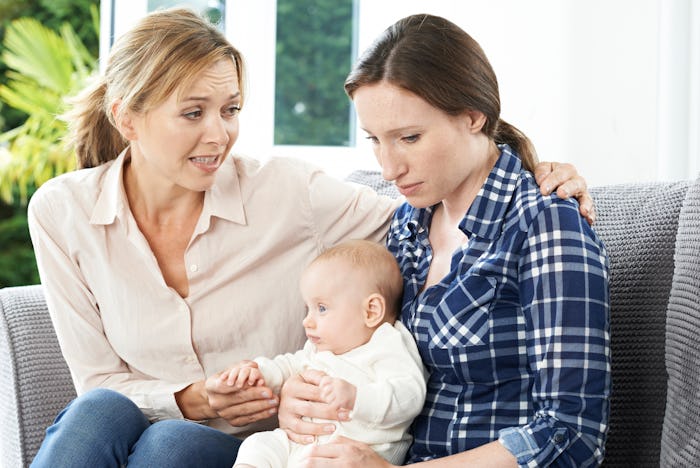When you're pregnant, you hear a lot about your hormones and how they affect you. But the fun doesn't stop once your baby is born. All anybody seems to talk about are the postpartum hormones that, in all honesty, can be worse than the pregnancy hormones. But what are postpartum hormones and how do they affect a new mom?
According to Postpartum Progress, your hormones shift dramatically after pregnancy and your body transitions to its postpartum life. And it all happens for good reason. Progesterone, the hormone that's been increasing throughout your pregnancy, drops in order to help milk production. But along with affecting breast milk, the decrease can mess with a mom's emotional well being as the hormone is required to maintain brain chemistry. And Fox News noted that those progesterone levels won't return to normal until you start ovulating again, which can explain why some moms feel down for several months after pregnancy.
Progesterone is just one example of postpartum hormones, but it's also prevalent in pregnancy hormones. According to Parents, all of the hormones shifting up and down can lead to feeling moody, sad, or depressed after giving birth. Your estrogen decreases, but prolactin increases to aid in milk production, and the back and forth can leave you feeling less than great.
But not all postpartum hormones make you feel crummy. Postpartum Progress noted that oxytocin, the hormone responsible for your bonding with your child, can surge after giving birth, leading to feelings of pleasure, maternal security, and comfort. Prolactin also increases as your body makes milk and that hormone can also trigger a maternal response and contribute to your emotional wellness, according to Postpartum Progress.
Postpartum hormones? Well, they're basically a big mess. New ones are surging, old ones are decreasing, and all of the ups and downs can do a number on your emotional state. The American Pregnancy Association noted that all of the hormonal changes can produce chemical changes in the brain, leading to depression. Although it's hard to go through, it's important to remember that feeling down, sad, or anxious is not your fault — it's just your brain trying to handle all of the increases and decreases of hormones. For many moms, those "baby blues" can turn into a much more debilitating postpartum depression, so knowing what's going on in your brain can help you keep calm and remember that it's not your fault.
The American Pregnancy Association also suggested that after 14 days, most moms should be feeling back to their old selves. There may be some emotional changes because of the whole, you know, parenting your own child thing, but the sadness and crippling feeling of the baby blues should surpass within two weeks as your hormones get worked out. Because so many of the hormonal changes are tied into breastfeeding, you can expect those to continue to waver, but reach out to your doctor if you're concerned in any way.
